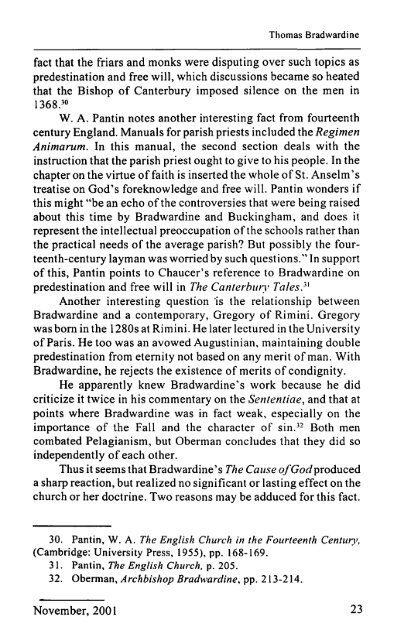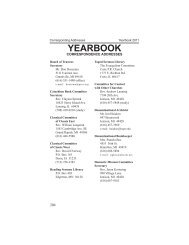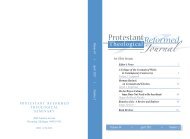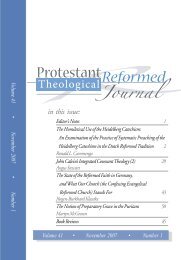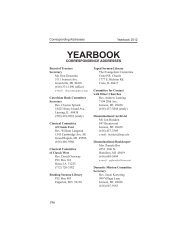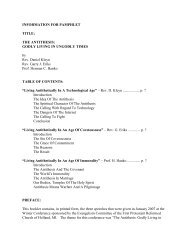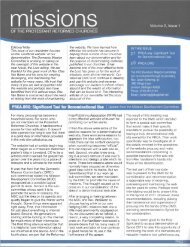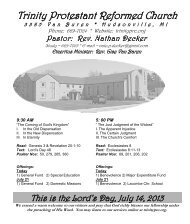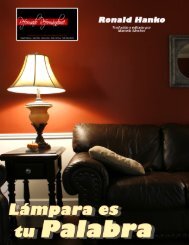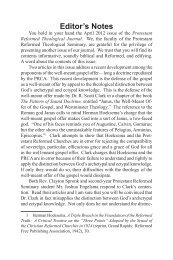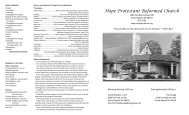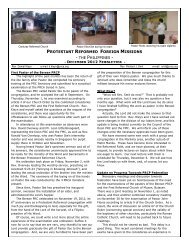pdf - Protestant Reformed Churches in America
pdf - Protestant Reformed Churches in America
pdf - Protestant Reformed Churches in America
You also want an ePaper? Increase the reach of your titles
YUMPU automatically turns print PDFs into web optimized ePapers that Google loves.
Thomas Bradward<strong>in</strong>efact that the friars and monks were disput<strong>in</strong>g over such topics aspredest<strong>in</strong>ation and free will, which discussions became so heatedthat the Bishop of Canterbury imposed silence on the men <strong>in</strong>1368. 30W. A. Pant<strong>in</strong> notes another <strong>in</strong>terest<strong>in</strong>g fact from fourteenthcentury England. Manuals for parish priests <strong>in</strong>cluded the RegimenAnimarum. In this manual, the second section deals with the<strong>in</strong>struction that the parish priest ought to give to his people. In thechapter on the virtue offaith is <strong>in</strong>serted the whole ofSt. Anselm'streatise on God's foreknowledge and free will. Pant<strong>in</strong> wonders ifthis might "be an echo ofthe controversies that were be<strong>in</strong>g raisedabout this time by Bradward<strong>in</strong>e and Buck<strong>in</strong>gham, and does itrepresent the <strong>in</strong>tellectual preoccupation ofthe schools rather thanthe practical needs of the average parish? But possibly the fourteenth-centurylayman was worried by such questions." In supportof this, Pant<strong>in</strong> po<strong>in</strong>ts to Chaucer's reference to Bradward<strong>in</strong>e onpredest<strong>in</strong>ation and free will <strong>in</strong> The Canlerbll1)' Tales. 31Another <strong>in</strong>terest<strong>in</strong>g question 'is the relationship betweenBradward<strong>in</strong>e and a contemporary, Gregory of Rim<strong>in</strong>i. Gregorywas born <strong>in</strong> the 1280s at Rim<strong>in</strong>i. He later lectured <strong>in</strong> the Universityof Paris. He too was an avowed August<strong>in</strong>ian. ma<strong>in</strong>ta<strong>in</strong><strong>in</strong>g doublepredest<strong>in</strong>ation from eternity not based on any merit ofman. WithBradward<strong>in</strong>e, he rejects the existence of merits ofcondignity.He apparently knew Bradward<strong>in</strong>e's work because he didcriticize it twice <strong>in</strong> his commentary on the Sententiae, and that atpo<strong>in</strong>ts where Bradward<strong>in</strong>e was <strong>in</strong> fact weak, especially on theimportance of the Fall and the character of s<strong>in</strong>. 32 Both mencombated Pelagianism, but Oberman concludes that they did so<strong>in</strong>dependently ofeach other.Thus it seems that Bradward<strong>in</strong>e's The Cause ofGodproduceda sharp reaction, but realized no significant or last<strong>in</strong>g effect on thechurch or her doctr<strong>in</strong>e. Two reasons may be adduced for this fact.30. Pant<strong>in</strong>, W. A. The English Church <strong>in</strong> the Fourteenth Century,(Cambridge: University Press, 1955), pp. 168-169.31. Pant<strong>in</strong>, The English Church. p. 205.32. Oberman, Archbishop Bradward<strong>in</strong>e, pp. 213-214.November, 200 I 23


